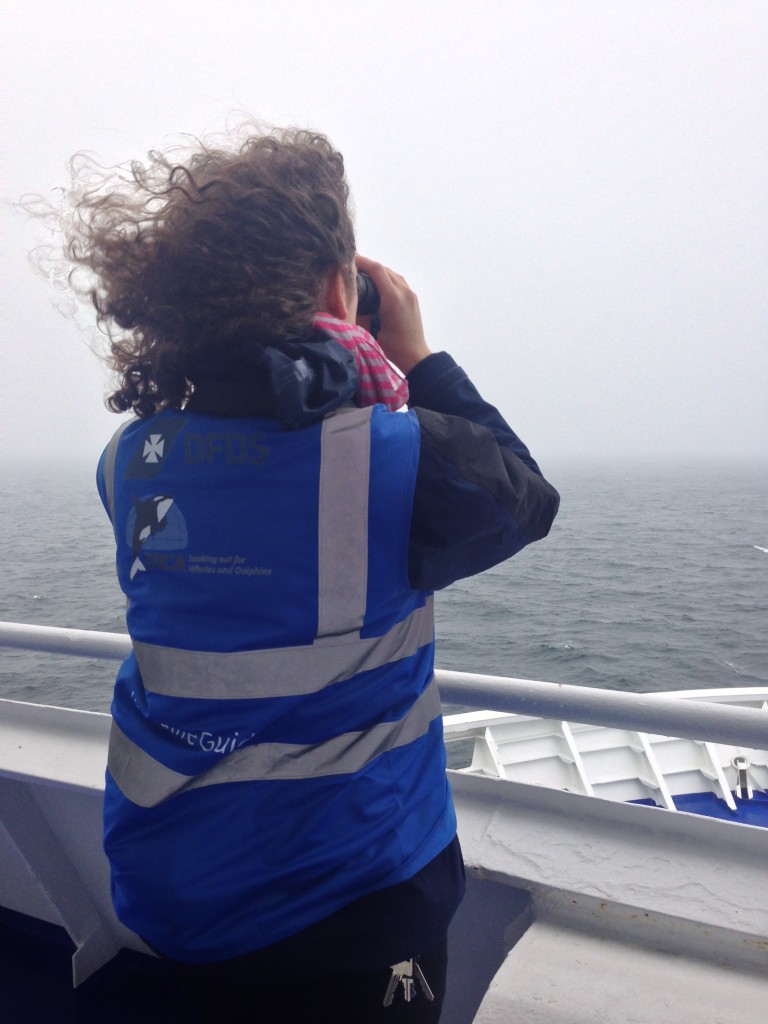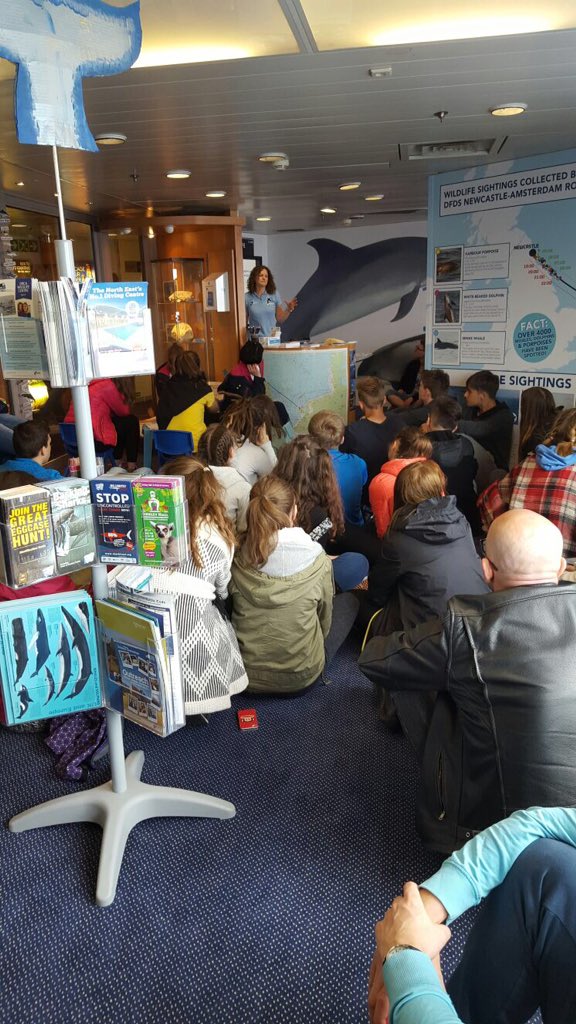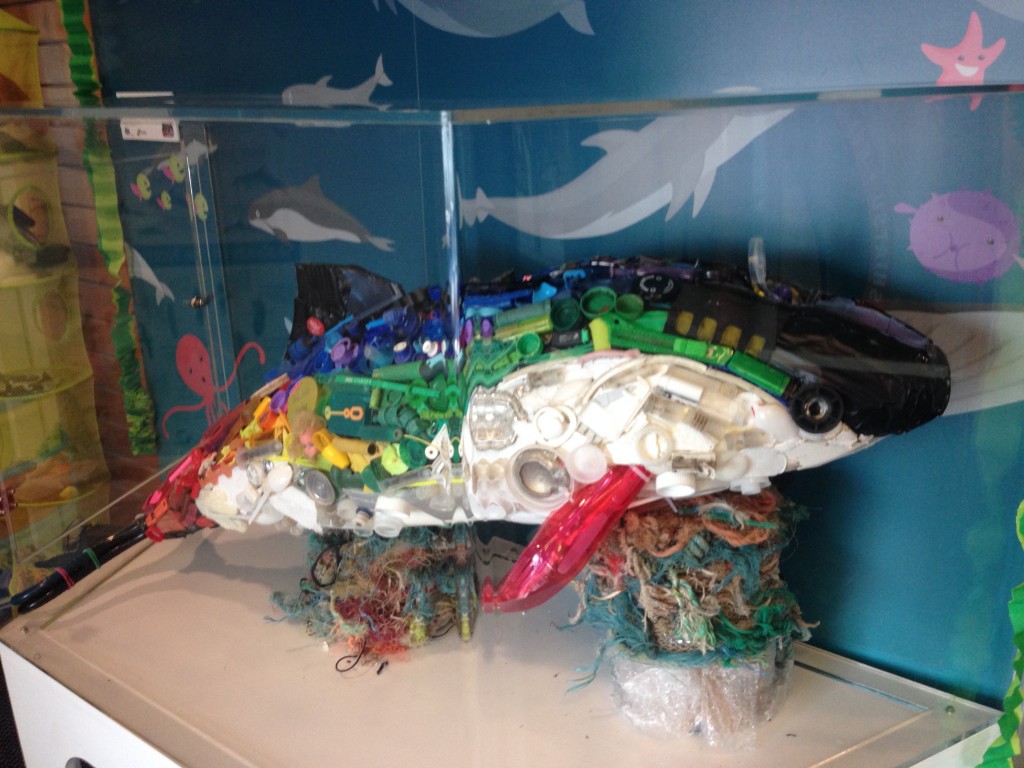News
A Summer Sailing the North Sea

After finishing my masters degree in Marine Biology last November, in March this year I began working for the whale and dolphin charity ORCA (Organisation Cetacea). ORCA have been working with international ferry operator DFDS Seaways by placing Wildlife Officers on-board the DFDS King Seaways for nine years in an effort to educate passengers about and survey the wildlife rich waters of the North Sea. This is the second season I have worked for ORCA; in the spring of 2014 I spent three months in a voluntary capacity on a Brittany Ferries ship in the Bay of Biscay.
This year working on the King Seaways travelling between Newcastle and Amsterdam I was the Senior Wildlife Officer. Alongside running the Wildlife Centre on-board, I was also responsible for the training of our Wildlife Officer Placement Volunteers who ranged from recent graduates to those looking at changing careers.
My favourite part of my job had to have been providing opportunities for passengers to see their first whale or dolphin! Seeing someone’s reaction when they spot their first whale or dolphin is very special, even more so when they never expected to see an animal in the North Sea.
A large proportion of the general public do not realise the extent of wildlife that can be observed in the North Sea. This isn’t just our magnificent whales and dolphins but a whole variety of bird life can also be spotted while sailing.
Since 2007 on our route between Newcastle and Amsterdam 10 species of cetacean have been positively identified, ranging from the tiny harbour porpoise to the second largest animal on the planet; the mighty fin whale. The three most common species that we spot however are the harbour porpoise, white-beaked dolphin and minke whale. Also this year we have seen bottlenose dolphins, common dolphins and Atlantic white-sided dolphins!
With the crossing being overnight we spend a lot of our time in the ORCA Wildlife Centre located on the ship. This for me is a wonderful space. It allows us to provide a wide range of fun and engaging environmental education for all passengers from 2 to 102 about North Sea wildlife and the marine environment with plenty of audience participation.
I have said my favourite part of this job is watching people’s faces light up with excitement when they first spot a whale or dolphin. A close second would be the dawn of understanding on a child’s face when they learn something new about our oceans. whether that be through conversation, games, or experimentation!
A brilliant new addition to the ORCA Wildlife Centre this year was ‘Debris’ the Marine Litter Porpoise! Created entirely out of rubbish that we collected from beaches around the North East coastline during early Spring this year. Debris is entirely made from the litter collected… no wire frame, or hollow inside; in fact the only thing on her not cleared from beaches is the glue holding her together! I love her, and she makes such an impact to everyone that sees her! She is a life size harbour porpoise. When people first look at her their response is “oh look at the multicoloured porpoise”… they then look a bit closet and start to realise what she is made of. I like to describe her as beautiful, yet terrifying. This is a unique and beautiful piece of art created by an environmental marine artist, writer, teacher and TV presenter Izzy Moreau. This may be a beautiful piece of art, but also a terrifying piece of art when you start to realise the quantity and variety of litter that ‘Debris’ is created from!
I have loved being out at sea this year and can’t wait to get back out to sea again soon! If you fancy reading more about my time on-board the DFDS King Seaways this summer you can read ORCA’s North Sea blog here.
Do you fancy getting involved? You can find out more about ORCA’s work and how you could get involved here.
Gear News
Introducing the TR-80, IR-50 and CS-30 Regulators from DYNAMICNORD

Whether you are a beginner or a professional diver – with the three new main regulators from DYNAMICNORD, everyone will find their favourite regulator. They all look super stylish.
Excellent performance with the TR-80
Quality and performance are the be-all and end-all for regulators. It is not for nothing that the TR stands for Tec Reg. The innovative design of the TR-80 guarantees absolute reliability – even in ice-cold waters.

Perfect breathing effort at 0.8 J/l / certified for diving in waters below 10 degrees / structural design made of solid brass for best cold protection / membrane-compensated design with dry seal of the first stage / reduced exhalation effort thanks to optimized exhalation membrane and bubble deflector / adjustable Venturi (dive/predive) and adjustment knob for individual inhalation comfort / innovative design of the front cover prevents free-flow in strong currents or when diving with scooters / design made of sandblasted brass, matt chrome finish / 2 HP and 4 LP outlets / mouthpiece made of high-quality, anti-allergic silicone for maximum comfort.


Amazing underwater adventures with the IR-50
The IR-50 is the top regulator for advanced and experienced divers. Natural breathing is the essence of this regulator.

Ideal breathing effort at 0.8 J/l /certified for diving in waters below 10 degrees / compensated membrane / adjustable venturi (dive/predive) and adjustment knob for individual inhalation comfort/ outlet valve and deflector for minimum exhalation effort and reduction of bubbles on the face / design made of sandblasted brass, matt chrome finish / 2 HP and 4 NP outlets / mouthpiece made of high-quality, anti-allergic silicone for maximum comfort.


The Workhorse – our CS-30
For diving centres and diving beginners – the workhorse stands for strong construction, reliability and robustness. Perfect for your training.

Optimal breathing effort at 0.8 J/l /recommended for diving in waters above 10 degrees / non-compensated piston / adjustable venturi (dive/predive) / outlet valve and deflector for minimum exhalation effort and reduction of bubbles on the face / design made of sandblasted brass, matt chrome finish / 1 HP and 3 NP outlets / mouthpiece made of high-quality, anti-allergic silicone for maximum comfort.


Octopus OP-30
The OP-30 is the ideal addition to all DYNAMICNORD regulators. It is identical in construction to the CS-30.

The TR-80, IR-50, CS-30 (DIN & INT) regulators and the Octopus OP-30 are available from DYNAMICNORD dealers and in the online store.
DYNAMICNORD – Your Outdoor Companion.
Marine Life & Conservation
Paul Watson Released as Denmark Blocks Japan’s Extradition Bid

Renowned anti-whaling activist Paul Watson has been released from custody in Greenland after spending five months in detention. Denmark’s Justice Ministry rejected Japan’s request for his extradition, citing insufficient guarantees that his time already served in custody would be credited against any potential sentence.
The 74-year-old Canadian-American was arrested on July 21 in Nuuk, Greenland’s capital, when his ship docked to refuel. His arrest was based on a 2012 Japanese warrant related to a 2010 encounter in Antarctic waters. Japan alleged Watson obstructed operations and caused damage to a whaling research ship during efforts to disrupt illegal whaling. Watson has consistently denied these claims, maintaining his commitment to marine conservation.
Denmark, which oversees extradition matters for Greenland, concluded that while the legal conditions for extradition were met, the lack of assurances from Japan regarding time-served credit made extradition untenable.
In a video shared by his foundation, Watson expressed gratitude and relief, saying, “After five months, it’s good to be out… and good to know they’re not sending me to Japan.” He added that the most difficult part of his time in custody was being separated from his two young sons.
Watson is a pioneering figure in marine conservation, known for founding the Captain Paul Watson Foundation in 2022 after decades of activism with the Sea Shepherd Conservation Society. His bold efforts to defend marine life have earned him widespread support, including from celebrities and conservationists. His work has also been featured in the acclaimed reality TV series Whale Wars.
Watson’s lawyer, Jonas Christoffersen, praised the decision, stating, “We are happy and relieved that Paul Watson is now free.” He added that Watson is eager to reunite with his family and continue his vital work.
The arrest occurred while Watson’s vessel, the M/Y John Paul DeJoria, was en route to the North Pacific with a team of 26 volunteers to intercept a Japanese whaling ship. His foundation described the arrest as politically motivated and emphasized that Watson’s actions were focused on ending illegal whaling practices.
Japan resumed commercial whaling in 2019 after leaving the International Whaling Commission, asserting that whale meat is a cultural tradition. Conservationists, however, continue to challenge these practices, highlighting their impact on marine ecosystems.
Despite the challenges, Watson remains steadfast in his mission to protect marine life and bring attention to whaling practices. His dedication to ocean conservation has made him a globally respected advocate for the environment.
-

 News2 months ago
News2 months agoIconic SS United States to become the World’s Largest Artificial Reef
-

 News3 months ago
News3 months agoBook Review – 52 Assignments: Underwater Photography
-

 Gear News3 months ago
Gear News3 months agoDYNAMICNORD – New German diving brand enters the British market
-

 News3 months ago
News3 months agoExploring Cenote El Pit: A Diver’s Dream
-

 Gear News3 months ago
Gear News3 months agoTry BARE drysuits (and maybe even win one!) this Friday with Sea & Sea at North West Dive Fest
-

 Marine Life & Conservation3 months ago
Marine Life & Conservation3 months agoBook Review: Coral Triangle Cameos
-

 Blogs2 months ago
Blogs2 months agoDive the Egyptian Red Sea this Autumn with Regaldive
-

 News3 months ago
News3 months ago2024 Ocean Art Underwater Photo Competition Announced




















